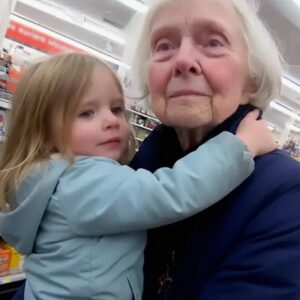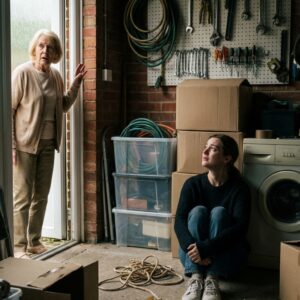The night my eleven-year-old called me crying in the rain, I learned just how cruel my mother could be. “Mom, my key doesn’t work,” Hannah whispered over the phone. “Grandma said we don’t live here anymore.” Her voice was trembling, soaked in confusion and fear. My stomach dropped. It was our home — the house I had helped my dying father care for, the same one where my daughter had grown up. But when I sped through the storm to the familiar porch, what I found shattered me: my little girl shivering under the porch light, clutching her backpack, and my mother standing in the doorway, wine glass in hand, calm as ever. “We needed privacy,” she said, waving me off. “It’s better this way. Less tension.” Her words were a knife, but her eyes — cold and satisfied — told me everything. She had planned this.
It wasn’t the first time she’d chosen cruelty over love. Growing up, my sister Brittany could do no wrong, while I was the family scapegoat. When my father fell ill, I moved in to care for him, cooking, cleaning, changing bandages — everything. My mother barely lifted a finger. Yet when he passed, she wasted no time repainting his room, replacing his photos with Brittany’s family portraits, and saying I should “move on.” I might have, if not for the call from Dad’s lawyer: “Your father placed the house in a living trust,” he said. “It belongs to you and your daughter.” I didn’t tell her right away. I wanted to believe there was still a chance for peace. But peace was never something my mother gave — only something she took away. Five days later, she changed the locks.
That morning, while Hannah and I sat in the car with nowhere to go, I realized I couldn’t stay silent anymore. I called the lawyer again and told him everything — how she’d thrown my daughter out, how she’d treated us like strangers. Within hours, papers were filed. When the notice was finally served, I waited in the car as my mother opened the door. Her smirk faded as she read the first line — Eviction for unlawful occupancy. She shouted, Brittany filmed, and the deputies kept their calm. “You have fifteen minutes to collect your belongings,” they said. My mother’s last words to me were venomous: “I hope you’re proud.” But as the deputies handed me the keys, pride wasn’t what I felt. It was relief.
That evening, I brought Hannah home. We walked through the empty rooms that now echoed with possibility instead of pain. “It’s ours again,” she said, her small voice filling the silence. Six months later, the garden is blooming. My mother and Brittany moved in together after their own worlds fell apart — I’ve heard the shouting hasn’t stopped. But here, the air is calm. Hannah says flowers grow faster when you stop yelling at them. I think she’s right. Sometimes, the hardest part of healing isn’t fighting back — it’s realizing that walking away and reclaiming your peace is the greatest revenge of all.





